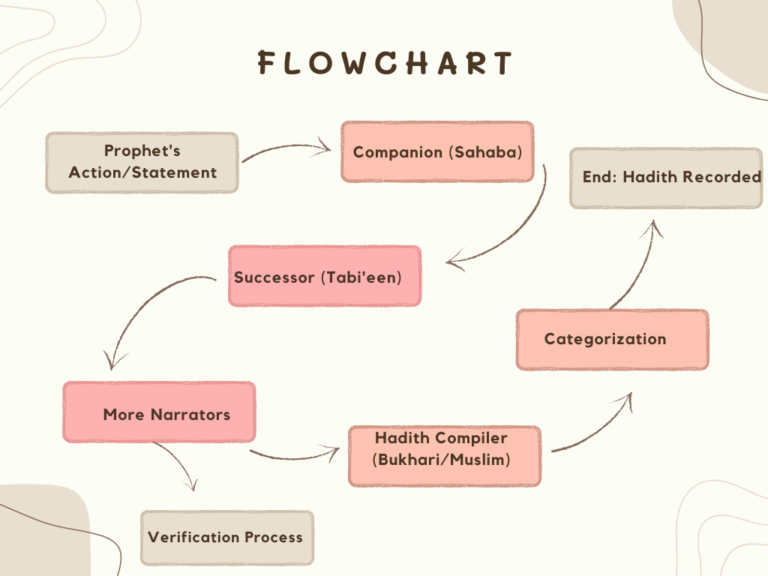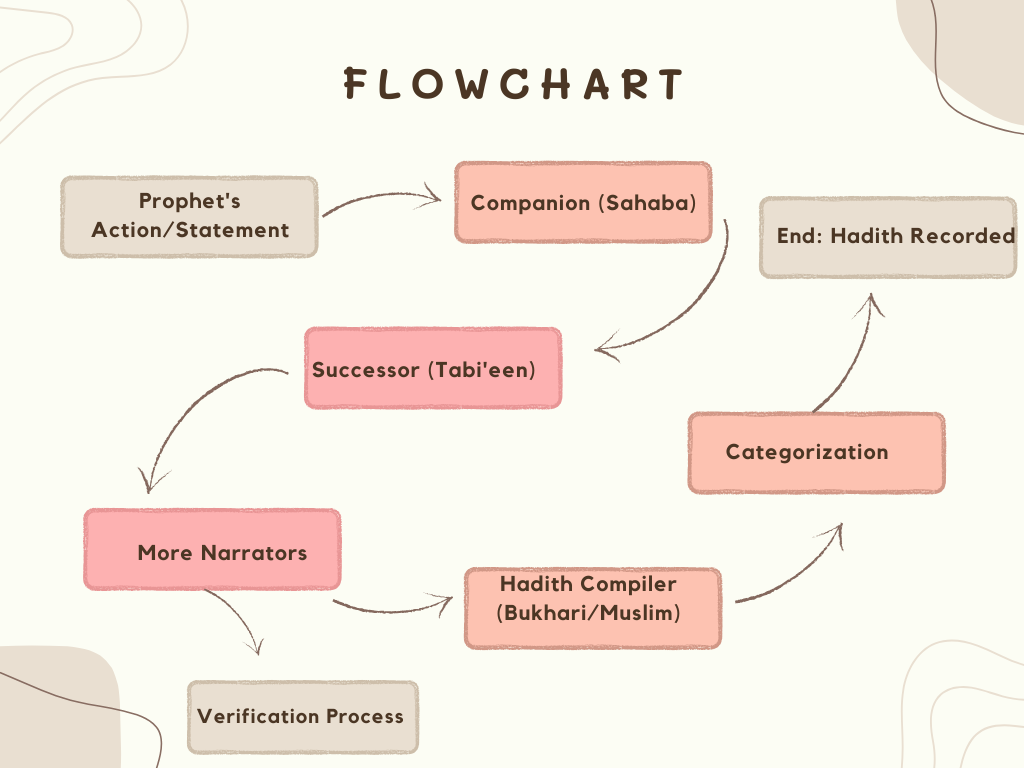
Hadith—the sayings, actions, and approvals of Prophet Muhammad (peace be upon him)—hold a foundational role in Islamic practice. They serve as a primary source of guidance for Muslims alongside the Quran, providing clarity on various aspects of life from religious rituals, ethics and morals to social interactions and governance. However, because Hadiths were transmitted orally before being documented, verifying their authenticity became a priority for early Islamic scholarship to safeguard Islamic teachings as a results a rigorous system of verification known as Isnad was developed.
Isnad, which refers to the chain of narrators who transmitted a Hadith from the Prophet to the time. It is akin to a pedigree chart, tracing the lineage of a Hadith back to its origin. Without a reliable Isnad, the authenticity of a Hadith could not be guaranteed. Therefore, Isnad plays a critical role in authenticating Hadiths and ensuring the integrity and preservation of the Islamic tradition.
This blog explores the significance of Isnad and its role in ensuring the authenticity of Hadith. We will examine how scholars use it to classify Hadiths, the criteria for evaluating Isnad credibility, and the impact of this methodology on Islamic practice and scholarship.
Contents
I. What is Isnad?
Definition of Isnad
Isnad literally meaning “support” or “prop,” and refers to the chain of transmission—a list of narrators who conveyed a Hadith from the Prophet (PBUH) to the person documenting it. Each individual in the chain is known as a “transmitter” or “raawi” and serves as a link, and the integrity of the Hadith depends on the credibility of the people in this chain.
The Isnad generally begins with the original source (the Prophet or a companion) and ends with the scholar who recorded it in a Hadith collection, such as Sahih Bukhari or Sahih Muslim. This structure provides a traceable path, giving scholars a way to confirm that a Hadith has been faithfully transmitted across generations.
Importance of Isnad in Hadith Studies
In Hadith studies, the Isnad is the backbone for determining whether a Hadith is authentic (Sahih), weak (Da’if), or fabricated (Mawdu). If even one link in the chain is unreliable, the Hadith’s classification can change. Islamic scholars developed Isnad science to critically analyze these chains, ensuring the accuracy of Hadith literature.
Historical Context of Isnad
The system of Isnad emerged during the early years of Islam, especially after the death of the Prophet (PBUH). As the Muslim community expanded and oral traditions grew, there was a need to safeguard Hadith literature from fabrications. Scholars began collecting and meticulously documenting chains of narrators to ensure that only authentic Hadiths would guide future generations. This practice became one of the most sophisticated methods for Hadith verification in any oral tradition.
II. Role of Isnad in Hadith Verification
How Isnad Functions
The function of Isnad is to establish a link between the Prophet (PBUH) and the documentation of a Hadith through credible narrators. Scholars analyze each narrator’s reliability by evaluating their moral character, memory, and historical accuracy. If all narrators in the chain are trustworthy, the Hadith is considered reliable.
Hadith Verification through Isnad
Isnad plays a pivotal role in Hadith verification. Scholars meticulously cross-reference multiple chains for the same Hadith to confirm their credibility, trustworthiness and consistency in transmission. If discrepancies or gaps are found in the Isnad, the Hadith is downgraded to a lower classification or even rejected.
Evaluation of Isnad
Evaluating Isnad involves several key steps:
- Assessing the moral integrity of each narrator e.g the narrator’s reputation for honesty, integrity, and adherence to Islamic teachings.
- Checking the continuity of the chain (ensuring no missing links).
- Verifying the accuracy of narrators’ memory and historical context this includes the narrator’s ability to accurately recall and transmit the Hadith as well as the narrator’s alignment with historical events and other known facts.
By following these criteria, scholars can determine the authenticity of a Hadith and classify it accordingly.
III. Isnad and Hadith Classification

Hadith classification depends heavily on the credibility of the Isnad. Based on the strength of the Isnad, Hadiths are categorized into:
- Sahih (authentic): Authentic Hadith with a strong and reliable Isnad.
- Hasan (good): Good Hadith with a generally reliable Isnad, but with some minor issues.
- Da’if (weak): Weak Hadith with significant flaws in the Isnad.
- Mawdu (fabricated): Hadith that is completely fabricated and has no connection to the Prophet Muhammad (peace be upon him).
If a Hadith has multiple strong Isnads, its classification is elevated. Conversely, if the Isnad contains unreliable narrators or breaks, the Hadith is classified as weak or fabricated.
Impact of Isnad on Hadith Classification and Islamic Teachings
The classification of Hadith based on its Isnad is crucial for Islamic scholars and practitioners as it affects how Muslims practice and understand their faith. It helps determine the weight and authority of a Hadith in guiding Islamic beliefs and practices. For example, Sahih Hadiths are used to derive Islamic laws, while weak Hadiths are avoided for legal rulings. Thus, Isnad directly influences Islamic teachings and practice.
IV. The Impact of Isnad on Islamic Scholarship and Practice
Influence on Islamic Scholarship
The development of Hadith studies through the lens of Isnad science has shaped Islamic scholarship. Isnad has helped protect Hadith literature from alterations, fabrications, and distortions. It has been a central focus of Islamic scholarship for centuries, with scholars dedicating their lives to the study and verification of Hadith. Prominent scholars, such as Imam Bukhari and Imam Muslim, applied rigorous Isnad evaluations to compile the most reliable Hadith collections. Their work continues to influence contemporary scholarship.
Guiding Islamic Practice and Decision-Making
Since Islamic laws and rituals are derived from authentic Hadith, Isnad has a profound impact on Islamic practice. Every aspect of Muslim life—prayer, fasting, charity, and ethics—is guided by verified Hadiths, ensuring that practices remain consistent with the Prophet’s teachings.
V. Criteria for Authenticity in Isnad
When scholars evaluate Isnad, they focus on several criteria, including:
- Continuity of the chain: There should be no missing links in the chain of narrators. Trustworthiness of narrators: Each narrators should be assessed for their trustworthiness and good moral character.
- Memory and accuracy: Narrators should be known for precise memory.
- Consistency: The content of the Hadith should align with other narrations and Islamic teachings.
The Role of Hadith Scholars in Assessing Isnad
Hadith scholars dedicate their lives to mastering the science of Isnad. Their rigorous methodology ensures that Islamic teachings remain unaltered and authentic across generations.
VI. The Significance of Isnad in Islamic Tradition
Preserving the Integrity of Hadith Literature
Isnad safeguards the integrity of Islamic teachings by ensuring that only verified Hadiths are transmitted. This method prevents the inclusion of fabricated narrations into the religious tradition.
Isnad’s Influence on Islamic Practice
The authenticity of Hadith, determined through Isnad, shapes Islamic rituals, ethics, and laws. Verified Hadiths provide a reliable framework for Muslim worship and social conduct.
Isnad’s Role in Islamic Scholarship
Throughout centuries, scholars have relied on Isnad as the foundation for Hadith studies. It remains an indispensable tool for contemporary Islamic research and continues to shape the academic study of Hadith literature.
VII. Conclusion
Recap of Isnad’s Importance
In summary, Isnad is the backbone of Hadith authentication, ensuring that the teachings of Prophet Muhammad (PBUH) remain preserved and unaltered. Through careful evaluation of chains of narrators, Islamic scholars classify Hadiths to guide Muslim practice and religious understanding.
The Continuing Relevance of Isnad
Even today, modern Islamic scholarship relies on Isnad to maintain the integrity of Hadith literature, ensuring that Islamic teachings remain trustworthy.
Final Thought
The significance of Isnad extends beyond authentication—it plays a vital role in shaping Islamic practice and scholarship, making it an essential part of the Muslim faith.
VIII. Call to Action
To gain a deeper understanding of Hadith studies, readers are encouraged to explore works by renowned scholars, such as Imam Bukhari and Imam Muslim. Further study of Isnad will offer valuable insights into the meticulous efforts made to preserve Islamic teachings and ensure the authenticity of the Prophet’s words.





